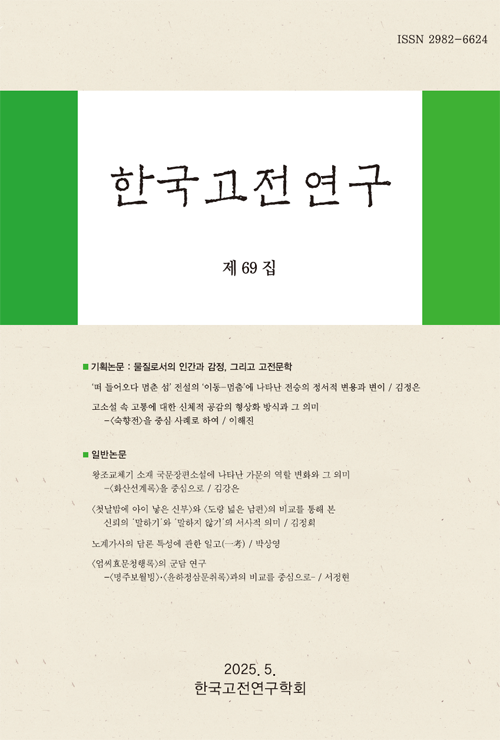- 영문명
- Emotion and Classical Literature from a Neuroscientific Perspective
- 발행기관
- 한국고전연구학회
- 저자명
- 황혜진(Hye-jin Hwang)
- 간행물 정보
- 『한국고전연구(韓國古典硏究)』제70권, 285~314쪽, 전체 30쪽
- 주제분류
- 인문학 > 문학
- 파일형태
- 발행일자
- 2025.08.31

국문 초록
본 연구는 감정에 대한 기존의 통념, 즉 감정은 본능적이며 이성보다 열등하고, 보편적이고 고정된 반응이라는 견해를 비판하는 입장에서, 감정을 ‘물질[신체] 기반의 구성된 개념’으로 재정의하는 시도를 하였다.
감정은 뇌와 신체가 상호작용하여 정동을 해석하는 인지적 과정의 산물이다. 뇌는 생존을 위해 신체 예산을 관리하며, 감각 정보를 시뮬레이션하고 과거의 경험을 통계적으로 참조하여 정동에 의미를 부여한다. 이때 감정은 정동을 해석하는 개념이 되며, 이 개념은 문화, 언어, 학습에 의해 구성된다. 따라서 감정은 선천적인 반사적 반응이 아니라 후천적이고 학습가능한 구조물이다.
또한, 이 연구는 마사 누스바움의 감정 철학을 바탕으로, 감정이 가치 판단과 평가를 포함하는 지적 작용이라는 점을 확인하고, 감정과 이성의 대립 구도를 재검토하였다. 이러한 이론적 기반 위에서 박지원의 산문과 판소리문학을 분석함으로써, 고전문학이 감정을 정교하게 언어화하고, 감정 개념을 사회적으로 공유하고 훈련하는 역할을 수행해 왔음을 보였다.
박지원의 문학은 감정 개념의 작동 방식을 뇌과학 이론보다 선취하였으며, 판소리문학은 감정을 다층적으로 형상화함으로써 감정 입자도를 높이고, 청중과의 감정적 상호작용을 유도해왔다. 또한, 고전문학은 마스터플롯 역할을 하며 개인과 집단의 세계 모형을 만들고 공유된 개념으로 공통적 감정을 구성하는 데 기여해 왔다.
영문 초록
This study reexamines the traditional view of emotions as instinctive and irrational reactions, and instead interprets them as cognitively and culturally constructed phenomena grounded in the physical body. Drawing on Lisa Feldman Barrett’s theory of constructed emotion, this paper explains that emotions are not innate or universal, but rather conceptual interpretations of affect formed through the brain’s predictive functions and interoceptive networks. Emotions are thus learned and shaped through experience and conceptual knowledge.
In addition, based on Martha Nussbaum’s philosophy of emotion, this study argues that emotions involve cognitive operations such as value judgments and evaluations, and calls into question the dichotomy between emotion and reason. With this theoretical foundation, the works of Park Ji-won and Korean pansori literature are analyzed to demonstrate how classical literature has refined the language of emotion, enabling the social sharing and cultivation of emotional concepts.
Emotions are cognitive constructs generated through the interplay of the body, brain, language, and culture, and literature functions as a site for organizing and transmitting such emotions as forms of social practice. By examining the intersection between emotion theory and classical literature, this study seeks to shed new light on the humanistic interpretation of emotion and the educational potential of classical literature in shaping emotional understanding.
목차
1. 서론
2. 감정의 기초로서 몸
3. 지력을 가진 감정
4. 감정과 문화, 그리고 고전문학
5. 결론
참고문헌
키워드
해당간행물 수록 논문
참고문헌
- 심청전
- 한국 판소리 정수
- 연암집
- 연암집
- 열하일기
- 연암집
- 한국신소설선집
- 고전문학연구
최근 이용한 논문
교보eBook 첫 방문을 환영 합니다!

신규가입 혜택 지급이 완료 되었습니다.
바로 사용 가능한 교보e캐시 1,000원 (유효기간 7일)
지금 바로 교보eBook의 다양한 콘텐츠를 이용해 보세요!



